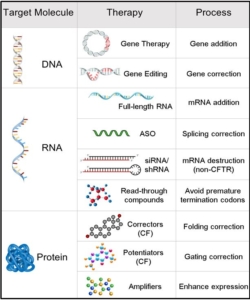Luka Clarke, PI at the Cystic Fibrosis Research Group – Functional Genomics and Proteostasis Group, is the first author of a new review paper published in Pharmaceutics , on which he presents two RNA-based therapeutic approaches that can be applied to all people with Cystic Fibrosis (CF), independently of their variants: common or rare. Find out how can this publication can give useful insights, not only to the CF research field, but also in other monogenic diseases.
What is the current state-of-art of your research field and why do you think it was relevant to publish this review now?
Research in the field of Cystic Fibrosis (CF) is currently at a very interesting point. For a large number of people with CF (most of whom carry the most common CFTR variant) the underlying defect of the disease can now be treated with a new generation of protein targeted drugs. So now the focus has turned towards covering the individuals who carry rare variants for which there is still no targeted therapy. This review covers two RNA based therapeutic approaches which might help fill in these gaps, namely antisense oligonucleotides (ASOs), which can correct splicing variants, and mRNA therapy (the same technology used in Covid vaccines), which like gene therapy might be of use for all people with CF, independently of their variants, common or rare.
On what extent can this publication be important in your scientific area?
We expect that this review will be useful for anybody interested in studying novel therapeutic approaches to treating monogenic diseases, and not just CF. It is aimed at showing how far efforts have come towards producing alternative solutions to the treatment of a number of rare conditions which cumulatively account for millions of people across the world. In the case of ASOs, there are already several approved drugs available for a number of monogenic conditions, although there is still much room for improvement.

Figure | Summary of novel therapeutic approaches for the treatment of monogenic diseases, targeting DNA, RNA and protein.
How have your particular research contributed to the field?
Our group is represented in the review, having published an important early paper demonstrating the correction of a rare splicing variant in the CFTR gene using ASOs (Igreja et al, 2016, Human Mutation), and we continue to study novel methods of correcting rare CFTR variants.
What are the future perspectives in the field? Is your team working in some of them?
We believe the perspectives in this field are bright, and rapid progress has been made, as can be seen in our review. We are currently involved in a H2020/Marie Curie Joint Doctoral Network proposal which, if accepted, will bring a PhD project to BioISI/Ciências ULisboa in 2024 to study ASOs and RNA therapy in the context of personalized medicine for people with monogenic diseases.
Discover more about Luka Clarke’s research here.
Get to know the Functional Genomics and Proteostasis Group here.
Read the full paper here.

Luka Clarke [photo provided by the researcher].


